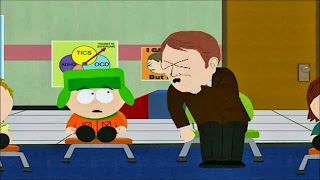Dateline: CLEVELAND—Horace Tabernacle is a 43-year old man with Tourette Syndrome, who displays a variety of vocal and motor tics, including the most infamous tic: for no apparent reason, he frequently shouts profanity in public, like the N-word or the C-word, horrifying bystanders and sometimes causing riots that have to be quelled by police. In fact, chaos seems to swirl around Horace like tornado winds around the eye of the storm.
For example, this RWUG reporter accompanied Horace as he visited the supermarket to shop for vegetables. Stopping at the avocados, Horace pointed at the dark-hued vegetables and shouted, “Those are the niggers. See? Right there, niggers! Niggers!” Some of the patrons within earshot appeared deeply offended. They scowled or shook their head. Parents covered their children’s ears and steered them away from Horace, realizing instantly that he was mentally unstable. Other shoppers were enraged rather than just embarrassed that the decorum set by Muzak had been upset by Horace’s outburst. An African-American woman picked up an avocado and launched it at Horace’s head, shouting “Who are you calling a nigger, you cracker!” Rubbing his head with one hand, he waived the woman off with the other, saying “Not you, not you, you’re a cunt.” A scuffle ensued which had to be broken up by security guards, who threw Horace out of the supermarket.
“That happens to me all the time,” he said later in an interview about his experience with the disorder. “I try to control the tics, but normal people don’t understand that it’s impossible. They go crazy when I’m around; I think they get crazier even than me. People should know I never use the power words as insults. Why would I? The insults wouldn’t even make sense half of the time. No, I shout them for the joy of it. Some words or phrases I love because they sound funny, like ‘bouillabaisse,’ ‘Come off it, soffit!’ or ‘tackleberry richenbacker.’ When I’m showering or waiting in line somewhere, I might say one or more of those silly phrases over and over, like a mantra. I know they sound strange, but chanting them comforts me. They’re tics, like itches that feel good when they’re scratched.”
Other words, however, Horace likes to shout because of their raw and somewhat mystifying power. “The N-word and the C-word aren’t fun to say just because of how they sound when their letters are pronounced. But I know the impact their meanings have on ordinary folks who are just trying to go about their business. It’s like those words are volcanoes and I delight in watching the explosions; people’s reaction to them is sublime. It’s like my irrationality is contagious, like everyone still believes in the magic power of words even though we’re all supposed to be modern.”
Psychiatrist Alfred Shiksamonger theorizes that the conventions of political correctness help civilize average citizens of technologically advanced societies, by forcing us to repress our “mythopoeic instincts.” We have the same faith in magic and spirits as our ancient ancestors did, he said, but the “hyperrationality of modern machines” drives us to compete on their level. “We civilized adults sacrifice the animal within to beat machines at their game; we adapt to the new niche, repressing ourselves to fit in and not stand out. Our personas are programmed.”
Horace spoke of a time years ago when he tried to ask a girl out on a date. “Never have I fought so hard not to provoke the volcano,” he said. “I didn’t want to scare her off. So we talked about this and that and all the while I felt like calling her a cunt to her face. Completely absurd, I know! Needless to say, it wouldn’t have expressed my real attitude towards her at all. I just had a childish wish to see what would happen, to see the social order we take for granted overturned. But I already knew what would happen and I couldn’t subdue the tic for long. I remember she was smiling at me after I’d said something funny. She was waiting for me to take the next step, to ask her out. I could have done so and left before I humiliated myself and ruined everything. Instead, I uttered the words of power. It was like a magic spell that transformed her. She slapped my face, told me to go fuck myself, and stormed off. No doubt she was angry she’d wasted so much time on a crazy person.”
However, according to Dr. Shiksamonger, “If you think about what a fellow like Horace is doing, strictly speaking, it’s farcical. The physical damage done just by his public profanity is perfectly insignificant and yet we go ballistic when he lets loose with the taboo words. When we say that shouting the N-word is politically incorrect, what we mean really is that when we hear the offensive word and notice its harmlessness, we become painfully aware of the arbitrariness of all rules of political correctness. We’d much rather vent our Id on a full-time basis.
“So we scapegoat someone like Horace instead of condemning the modern standards of normality that are better suited to the machines we build. Our hypocrisy is proven by the countless irrational preferences we succumb to in spite of our self-censorship, be they religious, political, or sexual, but when Horace flouts conventions with such abandon, he calls attention to the name of the game. And that’s the true source of our discomfort when someone like Horace is around. Who could care less about any paltry word! What’s terrifying is the beast within that’s subdued by mere mesmerism.”






